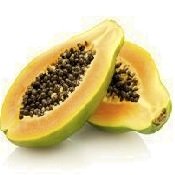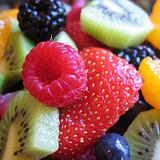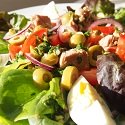Papaya Nutrition Facts,
Health Benefits of Papaya
All about papaya nutrition information, papaya benefits, papaya health benefits, nutritional value of papaya, calories in a papaya
The papaya is also known as a Paw Paw is some countries, although in the United States the Paw Paw is a completely different fruit. When ripe the skin is an orange color, with a yellow orange flesh and black seeds. The seeds are a little spicy and perfectly ok to eat. The fruit is shaped like a large pear.
The papaya is very low in calories, just 43 calories per serving (100g or 3.5oz). It is very low in fat and contains no cholesterol, so perfect as a snack or dessert.
The fruit is full of antioxidants. One serving provides more than the recommended daily intake (RDI) of vitamin C. It also provides a good source of vitamins A and B9 (folate).
The papaya contains two unique enzymes, chymopapain and papain. The former is used to treat sports injuries in the lower lumbar discs of the spine, whilst the latter aids our digestion by breaking down food. Papaya’s are very good for our blood circulation and are thought to be good for relieving the symptoms of rheumatism.
If you like your food a bit spicy, then why not save the black seeds, clean them, let them dry out and either blend or put them into a pepper mill and sprinkle over a salad.
One you have purchased a papaya, it will continue to ripen, avoid papaya’s that are green as you’ll have a long wait. You’ll know it’s ready to eat when the skin is slightly soft to the touch. If you have a latex allergy or if you are pregnant you should not eat the papaya.
Compare papaya nutrition facts to the other fruits.
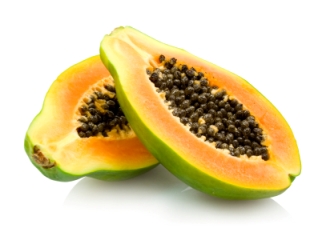
Papaya Nutritional Value
| Papaya nutritional information per 100 g (3.5 oz) Refuse: 38% (Seeds and skin) Scientific Name: Carica papaya |
|
|---|---|
| Proximates: | |
| Water | 88.06 g |
| Energy | 179 kJ (43 kcal) |
| Protein | 0.47 g |
| Carbohydrates | 10.82 g |
| Total Fat: | 0.26 g |
| Fiber | 1.7 g |
| Cholesterol | 0 mg |
| Minerals: | |
| Calcium, Ca | 20 mg (2 %) |
| Iron, Fe | 0.25 mg (1 %) |
| Magnesium, Mg | 21 mg (5 %) |
| Phosphorus, P | 10 mg (1 %) |
| Potassium, K | 182 mg (4 %) |
| Sodium, Na | 8 mg (0.3 %) |
| Zinc, Zn | 0.08 mg (0.5 %) |
| Copper, Cu | 0.045 mg (2 %) |
| Manganese, Mn | 0.040 mg (2 %) |
| Selenium, Se | 0.6 mcg (1 %) |
| Vitamins: | |
| Vitamin C | 60.9 mg (102 %) |
| Thiamine (Vit. B1) | 0.023 mg (1.5 %) |
| Riboflavin (Vit. B2) | 0.027 mg (1.6 %) |
| Niacin (Vit. B3) | 0.357 mg (2 %) |
| Pantothenic acid (B5) | 0.191 mg (2 %) |
| Vitamin B6 | 0.038 mg (2 %) |
| Folate (Vit. B9) | 37 mcg (9 %) |
| Vitamin A | 950 IU (19 %) |
| Vitamin E | 0.30 mg (1.5 %) |
| Vitamin K | 2.6 mcg (3 %) |
| Percentages are relative to US Recommended Daily Intake (RDI) for adults. | |
Author: Lana Soko
You Might Also Like:
Like This Page?
|
Share This Page:
|
Search Our Site:

Free E-Book:
We Recommend:
Looking to get your body into great shape? Get the very best results for your efforts and money! Save your valuable time from surfing the internet. These are theBestselling Weight Loss Programs
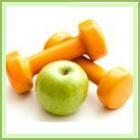
Programs that work and have thousands of satisfied customers worldwide!

 |
